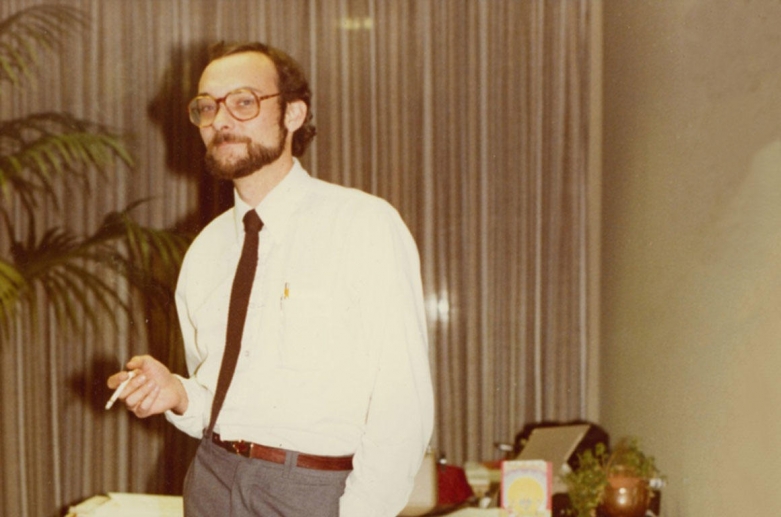Saying Goodbye to One of the Most Unsung Heroes of the LGBT Movement
Page Media

This month, the ACLU is celebrating, and saying goodbye to, one of its biggest change-makers. Matt Coles, deputy legal director and director of the ACLU’s Center for Equality, is retiring after 29 years. Here’s why he’s my hero.
Matt’s most recent work at the ACLU has focused on racial justice, voting rights, immigrants’ rights, and justice for people living with disabilities. He’s made major contributions in those fields, but what he’s best known for is his advocacy for LGBT rights.
It’s hard to explain just how big a deal Matt has been in the LGBT rights world. He’s been a fixture in the movement since the late 1970s. He’s engineered more change for LGBT people over four decades than any other advocate I know. And he’s not just done the work himself; his guidance and leadership have significantly shaped large parts of the LGBT rights movement.
Matt hadn’t yet finished law school when he drafted the first proposal for a sexual orientation nondiscrimination ordinance in San Francisco, as a legal advisor to the legendary Harvey Milk. He went on to draft many of the nondiscrimination ordinances throughout California and in other parts of the country, laws that became models for protections at the state and federal level.
After law school, Matt hung out a shingle on Castro Street in San Francisco, opening a law practice focused on LGBT individuals, couples, and businesses. At the same time, he worked together with friends to start Gay Rights Advocates, the first public interest law firm devoted to gay rights in the West.
Matt was also an early advocate for recognition of same-sex relationships. The term “domestic partnership” is now familiar to all of us. But neither the term nor the concept existed until 1981, and Matt was part of the group that coined the term and pushed for the first registry in San Francisco.
The 1980s were tragically difficult years for the LGBT community because of the AIDS epidemic. Much of Matt’s law practice focused on serving the legal needs of people living with HIV. He invented documents to try to ensure that lovers could visit their partners in the hospital. That seems like an easy thing today, but in the early 1980s it involved countless fights with hospital officials, other family members, and judges.
In 1987, Matt joined the ACLU of Northern California as its first gay rights lawyer. While there, he continued his work on HIV, litigating a groundbreaking case challenging the inadequate medical treatment of state prisoners with HIV. He also helped ballot campaigners fight off initiatives calling for the quarantining of people living with HIV.
In 1995, Matt became the director of the national ACLU LGBT & HIV Project, and in his 15 years in that role, Matt helped transform the nation’s laws on LGBT rights.
He was one of the lead lawyers in the landmark Supreme Court ruling in Romer v. Evans, where the court struck down Colorado’s constitutional provision that banned the state from enacting any gay rights laws. He litigated several challenges to the military’s “don’t ask, don’t tell” policy. He sued over criminal sodomy laws across the country. He fought for the ability of LGBT students to be open and honest about their sexuality and gender identity. And he was one of the primary architects of the LGBT movement’s nationwide plan to win the freedom to marry for same-sex couples.
Under Matt’s direction, the ACLU challenged marriage restrictions in seven states; took down state bans on adoption or foster parenting in Florida, Arkansas, and Missouri; and won the first federal court decision recognizing that discrimination based on gender identity is a form of sex discrimination. He also guided our legislative work, both in Congress and in the states, and built up the ACLU’s capacity to fight anti-LGBT ballot initiatives.
But even more important than the legal advances that Matt made is his contribution to how the ACLU and the LGBT rights movement more broadly go about making change. Matt has helped us realize that if we’re going to achieve lasting change on the difficult issues that we all care about, it’s not enough just to change the law through good court decisions and legislation. We also need to change the way America thinks about us and our place in society.
Matt realized that we could change people’s minds by telling our client’s stories and framing our legal work around those stories. It’s an insight that didn’t just shape the ACLU’s work, but also helped motivate and ground us on a day-to-day basis.
In short, there are few people with as central a role in the LGBT rights movement, past and present, as Matt Coles. We celebrate his vision and his tenacity, and we know that we, and our movement, are stronger because of all that he has done.
James Esseks is the Director of the ACLU LGBT & HIV Project.
